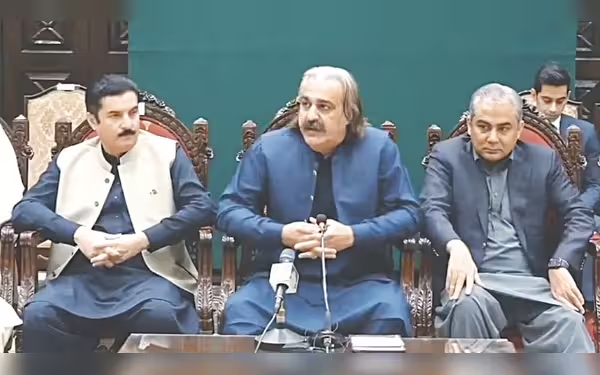Saturday, November 16, 2024 07:29 PM
Federal Government Agrees to Lift PTM Ban in Khyber Pakhtunkhwa
- Federal government agrees to lift PTM ban temporarily.
- Grand jirga convened to address PTM's concerns.
- PTM activists represent diverse political spectrum.
 Image Credits: dawn
Image Credits: dawnThe federal government has agreed to lift the PTM ban, allowing dialogue and public gatherings in Khyber Pakhtunkhwa.
PESHAWAR: The political landscape in Pakistan has taken a significant turn as the federal government has, in principle, agreed to lift the ban on the Pashtun Tahaffuz Movement (PTM). This decision comes after a multiparty grand jirga was convened by the provincial government, highlighting the ongoing dialogue surrounding the PTM's controversial status.
The ban on PTM was imposed recently, citing threats to national peace and security under Section 11B of the Anti-Terrorism Act of 1997. The notification described PTM as posing a "significant danger" to public order and safety, leading to a crackdown on its activists across Peshawar and other regions. Reports indicated that during this police action, three individuals lost their lives, and ten others sustained injuries, prompting widespread condemnation from lawmakers in the Khyber Pakhtunkhwa (KP) Assembly.
During the grand jirga, attended by Chief Minister Ali Amin Gandapur, Khyber Pakhtunkhwa Governor Faisal Karim Kundi, and Federal Minister for Interior Mohsin Naqvi, it was decided that the notification of the ban would be "held in abeyance" for the time being. This means that while the ban is not officially lifted yet, the PTM will be allowed to hold its scheduled Pashtoon Qaumi Jirga, which is set to take place today. The provincial government will oversee the event, ensuring that certain conditions are met, such as prohibiting inflammatory slogans and the display of the Afghan national flag.
Sources indicate that the federal government has empowered a provincial jirga to engage in discussions with the PTM to address various contentious issues. This jirga will be led by Speaker of the KP Assembly Babar Saleem Swati, comprising parliamentary leaders and members from both the treasury and opposition benches. The collaborative effort reflects a unified stance among KP's political leadership regarding the need for peace and dialogue.
During the discussions, it was emphasized that the PTM activists represent a diverse political spectrum, including members from the Pakistan Tehreek-e-Insaf (PTI), Awami National Party (ANP), and Pakistan Peoples Party (PPP). Their demands have been recognized as genuine, and many participants expressed that the grand jirga should have been convened sooner to address these concerns.
As the situation unfolds, it is clear that the KP government is taking steps to facilitate dialogue and restore peace in the region. The chief minister has reiterated that holding public gatherings is a constitutional right, and the provincial government has requested the federal government to allow them to manage the situation independently.
The lifting of the ban on PTM, albeit with conditions, marks a pivotal moment in Pakistan's political discourse. It underscores the importance of dialogue in resolving conflicts and highlights the need for a collaborative approach to governance. As the PTM prepares for its jirga, the hope remains that constructive discussions will pave the way for a peaceful resolution, fostering a more inclusive political environment in Khyber Pakhtunkhwa.













